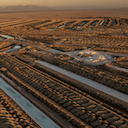
The Failure of COP28
The UAE, host to the latest UN climate conference, showcases the vices that need to be vanquished if we’re going to have anything approaching a green society.


The UAE, host to the latest UN climate conference, showcases the vices that need to be vanquished if we’re going to have anything approaching a green society.

In The Rig, the connections between the workplace dangers of oil drilling and the existential peril of climate change come into chilling focus.

By positioning itself as an expert partner in international climate efforts, GE gains access to developing economies, propping up a system that pushes countries deeper into debt and increases their reliance on unsustainable fuels.

The climate left needs to move beyond the question of which technologies are good or bad and focus instead on how we implement them.

Global climate institutions have embraced the primacy of capital, private firms, and markets—and in so doing have fatally undermined their own efficacy.

Relying on the private sector to decarbonize is a recipe for abandoning workers.

Ecological crisis, rural deindustrialization, and real estate speculation have created conditions in which the far right thrives.

In The Great Escape, Saket Soni recounts how he organized a group of Indian migrant workers to free themselves from a human trafficking scam and hold their captors accountable.

Can we rapidly reduce carbon emissions while minimizing the damage caused by resource extraction?

The Inflation Reduction Act presupposes a private sector–led transition. But battles over its implementation could build the political constituencies and expertise needed to take on the fossil fuel industry.

The protests in Atlanta build on a history of organizers challenging prison construction as a force for environmental destruction.

The U.S. climate movement has largely grown in response to setbacks and defeats. What will it do in the face of an underwhelming victory?
To get as many people as possible behind the project of decarbonization, we need to convince them that it can improve their lives.

Matt and Sam talk to writers on Succession and Extrapolations about the WGA strike and how they approach political topics and themes on their shows.

A preview of our Spring 2023 issue.